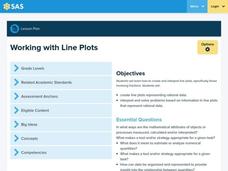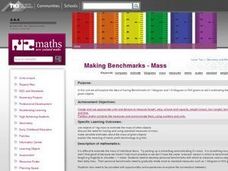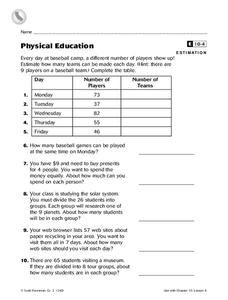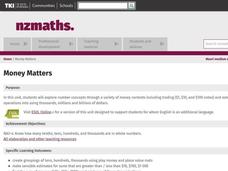Curated OER
What Can You Do In One Minute?
In this timing worksheet, students discover what tasks can be done in one minute. Students solve 5 problems in which they time themselves for one minute doing different tasks such as: building a cube tower, keeping a ball up in the air,...
Curated OER
Learning the "REAL" Phe Content of Foods
In this portion size instructional activity, students estimate the portion size, weight and amount of phe for 8 different foods before weighing each food in grams. Students answer 10 essay questions about nutrition and portion size. This...
Curated OER
Estimating Quotients
In this estimating quotients worksheet, learners solve 20 different problems that include estimating a variety of quotients in each. They divide each whole number and then estimate the answer in each problem to the nearest whole number.
Curated OER
Mystery Stars: Estimating Whole Numbers Using Fractions Shown on Sectors of a Circle
In this set of fraction worksheets, students cut out 6 pages of circles that show fractions with stars covering different sections of circles. They show one section of the circle in order to estimate the whole number of stars by looking...
Curated OER
Making Predictions About Measurement
Upper graders experiment with measurement. They estimate the length, volume, and weight of various objects, then rotate through stations making predictions concerning measurements and then testing their predictions.
Curated OER
Measure Mania
Groups of learners rotate through five classroom stations to estimate, measure, and record volume, length, weight, mass, and area using both customary and metric measure. They evaluate their data to determine how close their estimates...
Curated OER
Measuring Volume/Capacity Using the Metric System
There is more than one way to measure an amount, as learners discover by applying multiple measurement tools in these activities. Centimeter cubes, cylinders, beakers, and measuring cups are used to find the volume of regular and...
Math Worksheets Land
My Favorite Animal At The Zoo Pie Graph
What is your favorite animal at the zoo? Young mathematicians answer eight multiple choice questions, based on a survey of 50 people presented in a pie graph. Additionally, the graph does not display any numbers, but rather...
Charleston School District
Comparing and Ordering Irrational Numbers on a Number Line
Estimating the value of numbers is much harder than it sounds! Scholars compare and order the value of numbers presented in different forms including fractions, decimals, roots, integers, and pi. This builds on the previous lessons in...
Curated OER
Making Benchmarks - Mass
Elementary schoolers predict the mass for different objects. Then, using objects of 1kg mass, they make a more precise prediction. Afterwards, they discuss the need for having and using standard measures of mass.
Curated OER
Create a Math Road Trip
Students create a Road Trip. They work in small groups. Students are given a road map for each group. They plan a road trip between two cities on opposite edges of the map, estimating a reasonable distance to travel each day. Students...
Curated OER
One Hundred Things
Learners practice estimating by handling items in groups of ten. They visualize how much space 100 items, such as pennies, peas, or beans, will take up after holding 10 of them. Students measure the difference in volume between 10...
Curated OER
Telling Time as an Everyday Use of Numbers
How can we estimate time? Have your young mathematicians make a clock. Then they compare and contrast types of clocks. They practice writing times in two different ways and make a book about telling time.
Illustrative Mathematics
Making Cookies
Hooray for chocolate chip cookies! Ask your mathematicians to triple a chocolate chip cookie recipe and then reduce the recipe by one-fourth. Your class may need two days to complete, tripling the recipe the first day and reducing the...
Illustrative Mathematics
Why Randomize?
Your statisticians draw several samplings from the same data set, some randomized and some not, and consider the distribution of the sample means of the two different types of samplings. The exercise demonstrates that non-random samples...
Curated OER
Connecting Formulas Related to Geometric Figures
Students identify diagrams of quadrilaterals and circles by different names and classify the figures. They name the areas for each diagram and practice solving the formulas for each.
Curated OER
Teaching About Simple Machines
Students identify six different simple machines. They investigate the difference between the ideal and actual mechanical advantage. Students calculate the actual mechanical advantage for several simple machines.
Curated OER
Checking Addition and Subtraction by Estimation
In this mathematics worksheet, students solve various equations using different methods. They estimate each answer by checking the additions and subtractions given for each. Then, students write in the decision column wither definitely...
Curated OER
Estimation
Ten word problems provide practice in estimating. This worksheet is intended to accompany a specific text and lesson; however, it is useful without those resources.
101 Questions
Travel Times
It's just a sign of the times. Given a billboard with distances and travel times to two different interstate highway junctions, learners determine the speed limit. They must incorporate the concepts of distance, rate, and time with that...
Curated OER
Number and Operations- Using Gift Certificates
Students apply number and operation skills to learn how to spend a gift certificate. In this mathematical reasoning lesson, students use base 10 blocks as money and calculate how much money they have.
Curated OER
Money Matters
Third graders make fair trades and exchanges of their money in order to have practical experiences with the essential "rules" of our place value system. They create groupings of tens, hundreds, thousands using play money and place value...
Curated OER
Scale Factors
In this scale factors worksheet, 6th graders solve 10 different problems that include types of scale factors. First, they determine the missing dimensions in each problem. Then, students round their responses to the nearest tenth before...
Curated OER
Rounding Out
Third graders round numbers between 0 and 1000 to the nearest 10 and to the nearest 100.

























